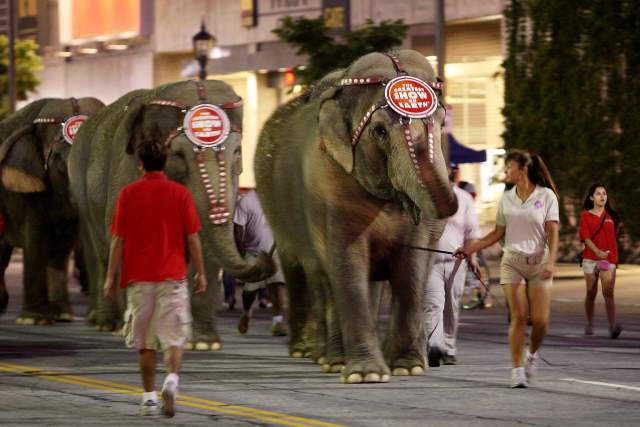Losing the animal rights war
May 11, 2016

Ringing Bros. and Barnum & Bailey Circus (RBBB) led its iconic elephants into a public performance of its traveling circus for the last time May 1. It ends a chapter in that entertainment organization’s history that started when P.T. Barnum purchased and transported Jumbo—perhaps the most famous elephant in history—to North America in the late 1800s.
Feld Entertainment, Inc. (FEI), owned by the Feld family, owns RBBB. Their decision to retire their performing elephants is a sobering lesson in winning a hard-fought battle at the expense of a war. It also underscores how the tip of the populist tail can fell societal institutions, in no meager part, via felony crime and skullduggery.
You likely remember at least parts of the legal story that ran for more than a decade.
The American Society for the Prevention of Cruelty to Animals (ASPCA), the Fund for Animals, the Animal Welfare Institute and others filed suit in July of 2000, alleging violations of the Endangered Species Act. Basically, they wanted to prohibit circuses from entertaining with elephants, so they alleged the abuse of them.
In July the following year, the U.S. District Court in Washington, D.C., dismissed the suit. On appeal, the case was reinstated in 2003. At that time, the appeals court ruled that if Tom Rider—one of the original plaintiffs, a former RBBB employee—could prove that he was “aesthetically injured” by Ringling Bros.’ treatment of the elephants, the case could proceed.
Instead of proving such injury, by the end of 2009, another federal court dismissed the case once again, finding, “…that Mr. Rider is essentially a paid plaintiff and fact witness who is not credible, and therefore [this court] affords no weight to his testimony regarding the matters discussed herein, i.e., the allegations related to his standing to sue."
The court discovered that plaintiff organizations, their lawyers and an entity controlled by those lawyers—Wildlife Advocacy Project—paid Rider at least $190,000 over the course of eight years—his sole source of income.
The court also found “…that ensuring Mr. Rider’s continued participation as a plaintiff was a motivating factor behind the payments to him, and that these payments were a motivating factor for his continued involvement in the case.”
The court also ruled against the other plaintiffs, saying they had no standing to sue under Article III of the United States Constitution.
Those plaintiffs appealed, of course.
A federal appeals court unanimously affirmed the dismissal of the case in October of 2011.
In its ruling, a three-judge circuit court panel affirmed the trial court’s determination that Rider was, “essentially a paid plaintiff and fact witness who is not credible…it is undisputed that between March 2000 and December 2008, (lead plaintiff) Rider received at least $190,000 from the organizational plaintiffs in this lawsuit, as well as from an organization run by plaintiffs’ attorneys.”
The plaintiffs sought a re-hearing, which was denied in January of 2012.
By that point in time, John Simpson, lead counsel for Feld Entertainment, noted, “Our client was forced to spend more than $20 million to defend this manufactured case, which was dismissed on the same grounds nearly eleven years ago in 2001.”
As might be imagined, FEI sought its own day in court, filing racketeering and conspiracy claims against the groups. We’re talking RICO—the Racketeer Influenced and Corrupt Organization Act—the one established in 1970 as part of the Organized Crime Control Act to go after the Mafia.
Specifically, FEI filed a federal lawsuit against ASPCA, the Humane Society of the United States (HSUS) and other animal rights activists and their lawyers for racketeering violations, malicious prosecution, abuse of process, and the Virginia Conspiracy Act. In July of 2012, the court upheld its right to proceed with the lawsuit.
In December 2012, the ASPCA settled its share of the lawsuits by paying Feld Entertainment $9.3 million.
In May of 2014, HSUS, along with their co-defendants, paid Feld Entertainment $15.75 million to settle the case.
In March last year, the Feld family announced plans to remove elephants from their traveling circuses and relocate them to the Ringling Bros. Center for Elephant Conservation in Florida.
So, FEI won, but lost. Ultimately, the groups prosecuted under RICO laws got what they wanted.
That’s worth pondering as the beef industry and peers in other livestock sectors continue figuring out how to address groundless charges brought against them by the same circle of activists.
So long, Jumbo.
You might also like:
Gallery: Get to know the 2016 Seedstock 100 operations
5 things to know about Netflix's The Ranch starring Ashton Kutcher
Projected lifetime returns: Bred heifers
3 key production areas that contribute to ranch-level sustainability
You May Also Like



